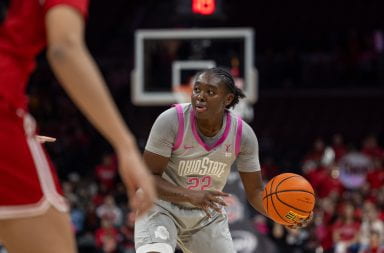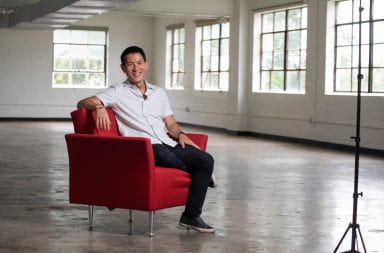
Screenshot of SmileBack app Credit: Courtesy of Dan Berenholtz
A new dating application might get students at Ohio State smiling.
Students at OSU received a mass email on Dec. 1 from a man many had never heard of: Dan Berenholtz, the CEO of SmileBack.
This email, with the subject line “App for OSU Students,” discusses a new social and dating app.
“Recognize that cute guy or girl you’ve seen around campus? Send them an anonymous smile and if they guess it was you, their first drink is on us,” the email reads. “If they don’t, they’ll never know it was you and you won’t have that awkward encounter in the library.”
The email also mentioned that SmileBack is looking for a representative member of the student body at OSU.
This app, which is only available on the iPhone, is a game where students can send anonymous smiles.
Students first select a profile photo and enter their preferences in romantic partners through age and gender categories.
They are then given five profile pictures, captioned with a name and age, and have two chances to correctly guess which person sent a smile to their phone. If students guess correctly, they can message the person who smiled at them and get a drink voucher for a local bar, Berenholtz said.
Each day, four smiles are administered to each user of the app. If no match is found, then the student has four more chances again the next day to find matches.
Although drink vouchers might sound enticing, there isn’t a way to redeem a drink at OSU yet, or at many other universities, for that matter.
“We don’t have a place at Ohio State because we have been launching faster than expected,” Berenholtz said.
So although the app administers a drink voucher, OSU students currently can’t redeem it anywhere.
The company is currently interviewing campus representatives from local restaurants and bars, but has not made any contacts yet. There is an indefinite wait for the amount of time this feature will be available at OSU. In the meantime, this app serves a purely social function.
The app is currently available only for iPhone users.
“My number one observation is that the app in not available on Android yet. We need love, too,” said Michael Schuler, a fifth-year in industrial and systems engineering.
Berenholtz said the company has been getting a lot of requests from Android users and would like to have SmileBack available to more cellphones.
Berenholtz dropped out of his management science and engineering graduate program at Stanford with his current business partner, Venkat Dinavahi, to begin SmileBack.
Berenholtz graduated from Cornell University before attended graduate school in California. The two business partners began testing in 2012 at George Washington University in Washington, D.C. Since then, expansion has been rapid, and OSU is one of the newest campuses to be included.
Dating apps and online dating are not a new phenomenon, so it can be hard for new companies to stand out.
The game function does add a different element, but some students said the similarities in function to other apps that already exist might hinder them from downloading SmileBack.
“My first impression was that it reminds me of Tinder,” said Joe Staff, a third-year in economics, after downloading the app on Dec. 3.
Tinder is a popular dating app where people can approve of or pass by someone based on their profile picture and bio, and is accessible on both iPhone and Android phones.
Berenholtz said, though, that he thinks SmileBack still has a valid place on the market.
“The thing that I think is great about SmileBack is that there are so many students ‘smile back’ that you would not meet otherwise,” he said.
So far, Berenholtz said more than 60,000 students use the app nationally, and SmileBack is available on more than 50 campuses. The undergraduate demographic is more active than graduate students, although both have access.


